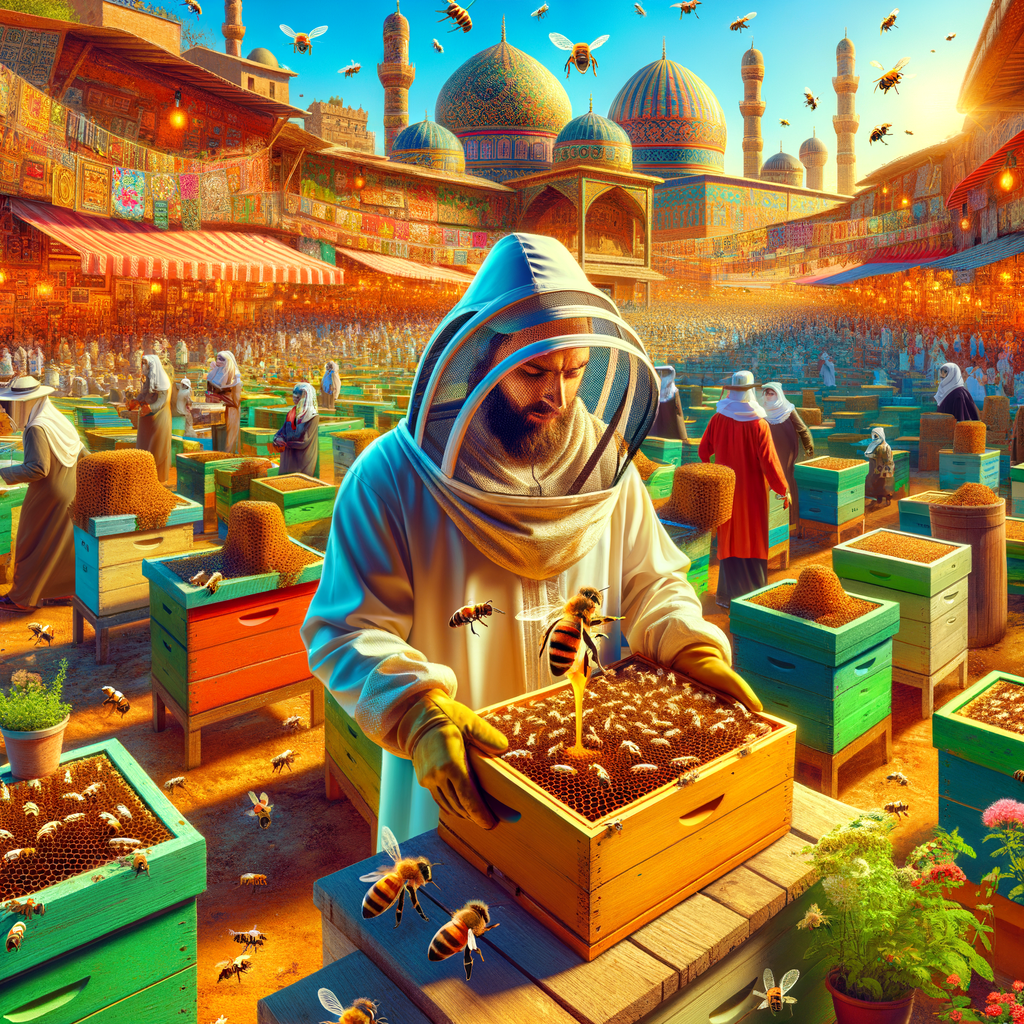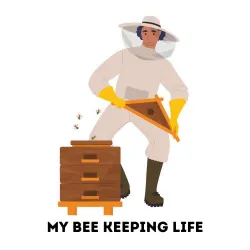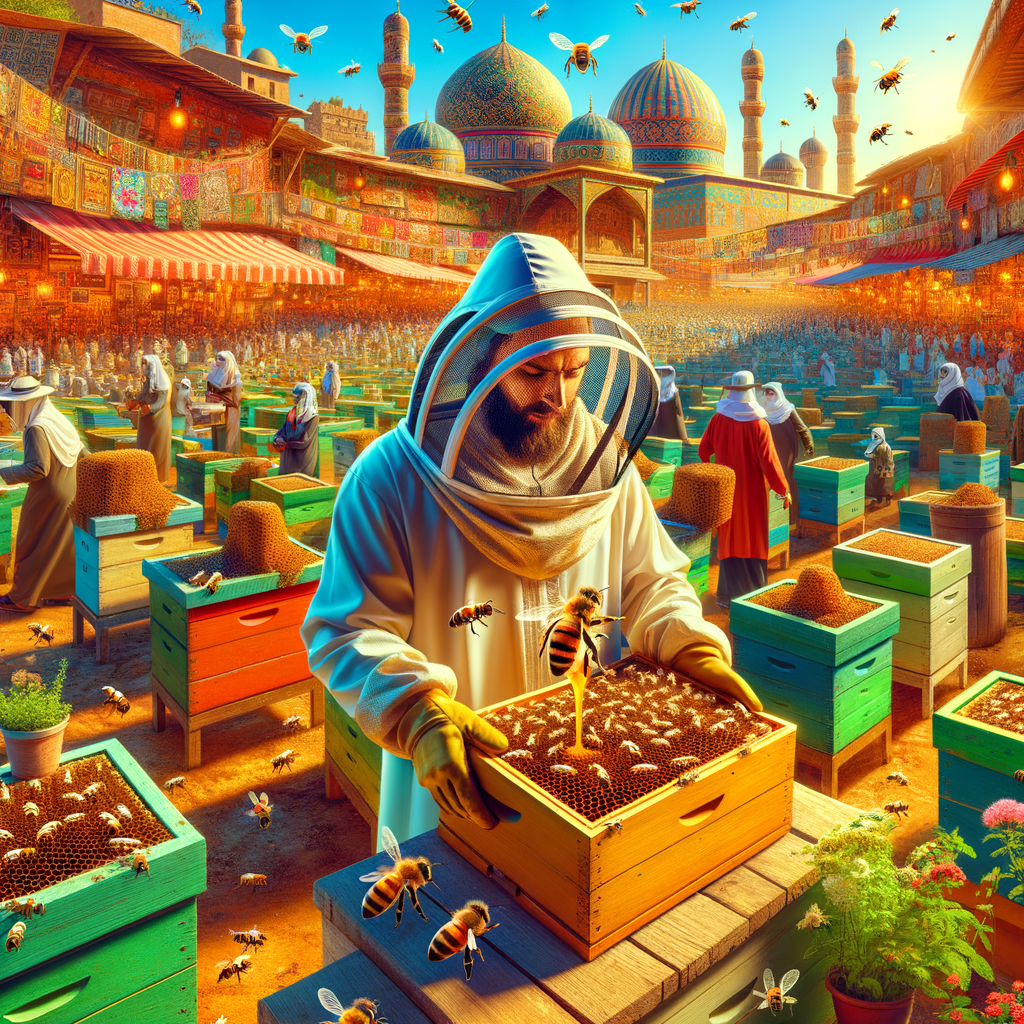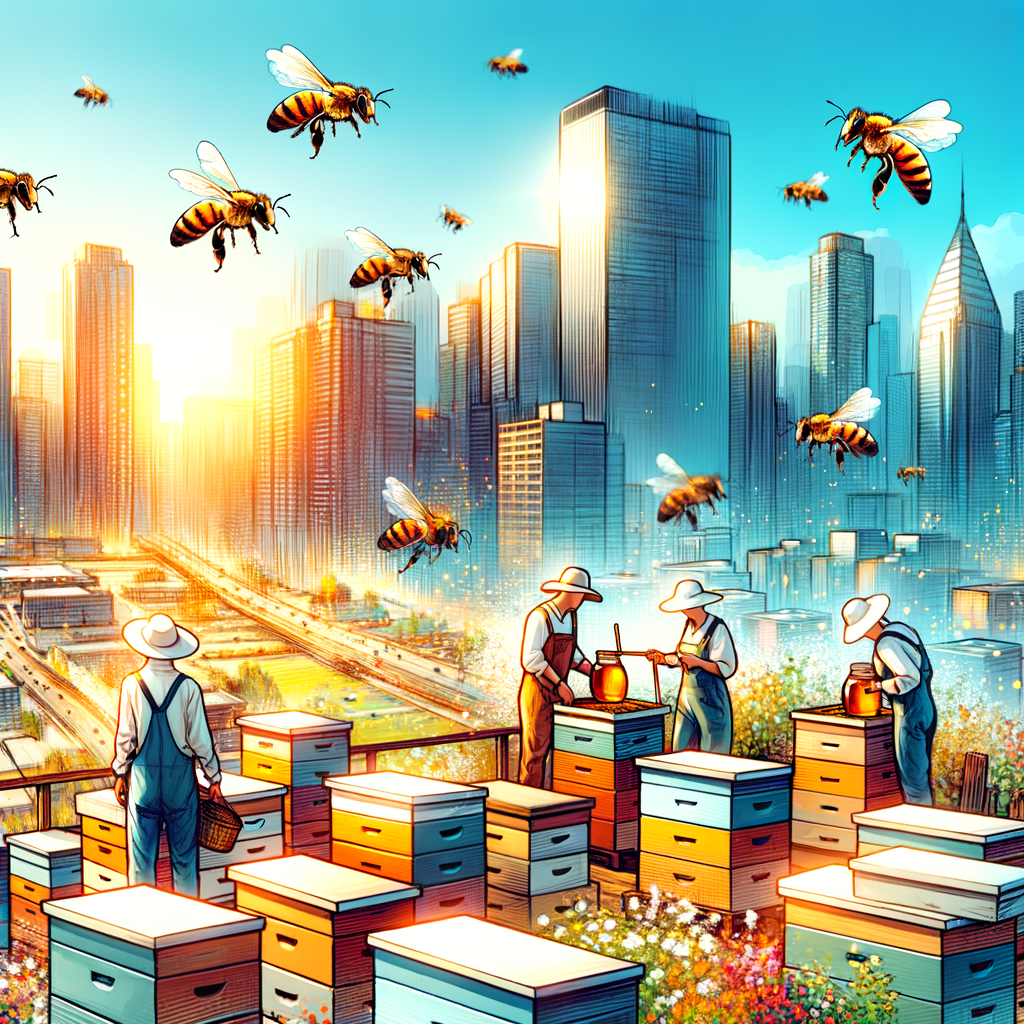
Introduction: The Importance of Local Beekeeping Businesses
Welcome to our blog post about the importance of local beekeeping businesses. In this post, we will explore the role of these businesses in our local economies and why it is crucial to support them.
-
- Overview of the role of beekeeping businesses in local economies
Beekeeping businesses are more than just honey producers. They play a significant role in our local economies. These businesses contribute to job creation, providing employment opportunities for many people in our communities. They also contribute to the local economy by selling honey and other bee-related products such as beeswax, pollen, and propolis. These sales generate income that is often reinvested back into the local economy.
Moreover, beekeeping businesses play a crucial role in agriculture. Bees are excellent pollinators, and without them, many of our favorite fruits and vegetables would not exist. By maintaining healthy bee populations, beekeeping businesses help ensure the success of local farms and orchards.
-
- Importance of supporting local businesses
Supporting local businesses, including beekeeping businesses, is vital for several reasons. When we buy from local businesses, we are directly supporting our neighbors and community members. This support helps to keep money within our local economy, contributing to its growth and prosperity.
Additionally, local businesses often provide unique products and services that large corporations cannot match. In the case of beekeeping businesses, this might include locally produced honey with a taste unique to our region. By supporting these businesses, we help to preserve this uniqueness and diversity.
Finally, supporting local businesses can help to build a sense of community. When we buy from local businesses, we are not just customers, but also neighbors and friends. This sense of community can help to make our towns and cities better places to live.
In the following sections, we will delve deeper into the world of beekeeping, exploring topics such as sustainable beekeeping practices and honey bee conservation. We hope you will join us on this journey and come away with a greater appreciation for the important role that local beekeeping businesses play in our communities.
Understanding Beekeeping
Let’s dive into the fascinating world of beekeeping. It’s a practice that dates back thousands of years and has evolved significantly over time. We’ll explore what beekeeping is and its history.
What is Beekeeping?
Beekeeping, also known as apiculture, is the maintenance of bee colonies, usually in hives, by humans. It involves a deep understanding of the bee’s behavior and their needs. Now, let’s break down this concept and its history.
- Definition and explanation of beekeeping: Beekeeping is the art and science of raising honeybees. Beekeepers provide a safe and secure place for bees to live and, in return, bees produce honey and other products like beeswax, pollen, and royal jelly. Beekeeping isn’t just about honey production; it’s also about helping the environment. Bees play a crucial role in pollinating plants, which helps our food grow.
- History and evolution of beekeeping: Beekeeping has a rich history that dates back to ancient times. The earliest evidence of beekeeping is from rock paintings in Spain that are over 8,000 years old! In the past, people used simple hives made from straw or clay. Over time, beekeeping methods have evolved. Today, modern beekeepers use specially designed hives and tools to care for their bees and collect honey. The understanding of bee behavior and health has also improved, leading to better care for these essential creatures.
From this, we can see that beekeeping is not just a hobby or a business. It’s a practice that benefits our environment and contributes to our food supply. It’s a tradition that has been passed down through generations, adapting and evolving with the times.
The Importance of Beekeeping
Beekeeping is an essential practice that has a significant impact on our environment, economy, and society. Let’s take a closer look at these benefits.
-
- Ecological benefits of beekeeping
Beekeeping plays a critical role in preserving our ecosystem. Bees are known as nature’s most efficient pollinators. They help in the pollination of over 70% of the world’s crops, which we rely on for food. Without bees, our food supply would be severely threatened. Beekeeping helps maintain bee populations and promotes biodiversity.
-
- Economic benefits of beekeeping
Beekeeping also has significant economic benefits. It provides a source of income for many farmers and small businesses. According to the National Honey Board, the honey industry contributed more than $4.7 billion to the U.S. economy in 2017 and supported more than 22,000 jobs. Moreover, the pollination services that bees provide are worth billions of dollars to the agriculture industry.
-
- Social benefits of beekeeping
Beekeeping also has social benefits. It encourages community engagement and education about the environment. It can be a rewarding hobby that brings people closer to nature and teaches them about the importance of conservation. Additionally, beekeeping can have therapeutic benefits, helping to reduce stress and improve mental well-being.
It’s about supporting our ecosystem, boosting our economy, and bringing communities together. By understanding and appreciating the importance of beekeeping, we can help ensure a sustainable future for our planet.
Local Beekeeping Businesses
Local beekeeping businesses play a crucial role in our communities. They not only provide us with delicious honey but also contribute significantly to our local economies. Let’s delve into the roles of these businesses.
Role of Local Beekeeping Businesses
Local beekeeping businesses have two primary roles:
- Contribution to local honey production: Local beekeepers are the backbone of local honey production. They maintain hives, care for the bees, and harvest the honey. This honey is often sold directly to consumers at farmers’ markets or through local retailers. It’s a sweet deal for everyone involved!
- Impact on local economy: Local beekeeping businesses also have a significant impact on the local economy. They create jobs, support local retailers, and contribute to the overall economic health of the community. According to a study, the beekeeping industry contributed over $125 million to the U.S. economy in 2019 alone. That’s a lot of buzz for the buck!
By understanding the role of local beekeeping businesses, we can better appreciate their contribution to our communities and the importance of supporting them. So next time you enjoy a spoonful of local honey, remember the hardworking local beekeepers behind it.
Benefits of Supporting Local Beekeepers
When we talk about the benefits of supporting local beekeepers, three main points stand out. These are boosting the local economy, encouraging sustainable beekeeping practices, and preserving local biodiversity. Let’s delve into each of these benefits.
- Boosting Local Economy
Supporting local beekeepers has a direct impact on the local economy. When you buy honey and other bee products from local beekeepers, you’re essentially putting money back into your community. According to the National Honey Board, the honey industry contributed more than $4.7 billion to the U.S. economy in 2017. Imagine the impact if more people chose to buy local!
- Encouraging Sustainable Beekeeping Practices
Local beekeepers are often more invested in sustainable beekeeping practices than larger commercial operations. They understand the importance of maintaining healthy bee populations and are more likely to use methods that are less harmful to bees. By supporting these local businesses, we can help promote and encourage these sustainable practices.
- Preserving Local Biodiversity
Bees play a critical role in our ecosystem. They are vital pollinators, helping to fertilize flowers by spreading pollen from the male parts of a flower to the female parts. This leads to the production of fruits, vegetables, and nuts that we eat. By supporting local beekeepers, we are indirectly helping to preserve our local biodiversity.
It’s about contributing to the local economy, promoting sustainable practices, and preserving our local biodiversity. So next time you need to buy honey, consider buying from a local beekeeper. You’ll be making a difference in more ways than one.
Sustainable Beekeeping
Sustainable beekeeping is an essential practice that ensures the survival of bees and the environment. It is a method that focuses on the health and wellbeing of the bees, rather than just honey production. Let’s delve into the principles of sustainable beekeeping.
Principles of Sustainable Beekeeping
-
- Definition and Importance of Sustainable Beekeeping
Sustainable beekeeping is the practice of maintaining bee colonies in a manner that does not harm the bees, their environment, or the beekeeper. It aims to balance the needs of the bees with the needs of the beekeeper, ensuring a healthy and productive relationship. The importance of sustainable beekeeping cannot be overstated. Bees play a crucial role in pollinating plants, which is vital for food production. Without bees, our food supply would be severely impacted.
-
- Key Principles and Practices in Sustainable Beekeeping
The principles of sustainable beekeeping revolve around the health and wellbeing of the bees. These include:
-
- Natural Beekeeping: This involves minimal interference with the bees and their natural behaviors. It includes allowing bees to build their own comb and not using chemicals or artificial feeding.
- Responsible Harvesting: This means only taking excess honey, leaving enough for the bees to survive the winter.
- Biodiversity: Planting a variety of flowers and plants that bloom at different times of the year ensures a constant food supply for the bees.
- Education and Advocacy: Spreading awareness about the importance of bees and the threats they face is a key part of sustainable beekeeping.
Sustainable beekeeping is not just about honey production. It’s about ensuring the survival of these vital creatures and, in turn, our own survival. By practicing sustainable beekeeping, we can help protect bees and the important role they play in our ecosystem.
Local Bee Farms and Sustainable Practices
Let’s explore the world of local bee farms and how they are making a difference through sustainable practices. We will look at some case studies and discuss the benefits these practices bring to local communities and economies.
- Case studies of local bee farms practicing sustainable beekeeping
One shining example of sustainable beekeeping is the Honeybee Haven in California. They have adopted a natural approach to beekeeping, avoiding the use of chemicals and pesticides that can harm bees. Instead, they focus on creating a healthy environment for the bees, planting a variety of flowers and plants that provide a rich source of nectar and pollen. This not only helps the bees to thrive but also results in high-quality honey.
Another case study is the Sweet Buzz Apiaries in Pennsylvania. They have implemented a rotational grazing system, moving their hives around to different locations throughout the year. This helps to prevent overgrazing and ensures a steady supply of food for the bees. It also reduces the risk of disease and pests, as the bees are not confined to one area.
- Benefits of sustainable practices to local communities and economies
Sustainable beekeeping practices bring numerous benefits to local communities and economies. Firstly, they help to preserve the local bee population, which plays a crucial role in pollinating crops and plants. This supports local agriculture and food production, contributing to food security and economic stability.
Secondly, sustainable bee farms often produce high-quality honey and other bee products, which can be sold at a premium. This creates jobs and generates income for local communities. In addition, these farms often attract tourists and visitors, boosting local tourism and bringing additional revenue to the area.
Lastly, sustainable beekeeping practices help to protect the environment. By avoiding harmful chemicals and promoting biodiversity, these farms contribute to the health of local ecosystems. This can have long-term benefits for the community, including cleaner air and water, and a more resilient environment.
Sustainable practices in local bee farms are not just good for the bees, they are also good for the community and the economy. By supporting these farms, we are investing in a sustainable future for all.
Honey Bee Conservation
Our buzzing friends, the honey bees, play a crucial role in our ecosystem. However, they are facing significant threats that are causing their numbers to decline. Let’s delve into these threats and understand their impact on local beekeeping businesses.
Threats to Honey Bees
There are numerous challenges that honey bees are currently facing. These threats not only affect the bees themselves but also have a significant impact on local beekeeping businesses.
-
- Overview of the Challenges Facing Honey Bees
Honey bees are facing a myriad of challenges that are causing their numbers to dwindle. These include habitat loss, climate change, exposure to pesticides, and diseases. Habitat loss occurs when areas rich in flora, which bees depend on for food, are destroyed for human activities. Climate change disrupts the timing of flower blooming, which can leave bees with less food. Pesticides can poison bees, while diseases and parasites can wipe out entire colonies.
-
- Impact of These Challenges on Local Beekeeping Businesses
These challenges have a direct impact on local beekeeping businesses. With fewer bees, there is less honey to harvest, leading to lower profits. Additionally, the cost of replacing lost bees can be high, further straining these businesses. The decline in bee populations also means fewer bees to pollinate crops, which can lead to lower crop yields and impact the food supply chain.
Despite these challenges, there is hope. Local beekeeping businesses play a significant role in honey bee conservation. By understanding the threats to honey bees and their impact on local businesses, we can all play a part in ensuring the survival of these vital creatures.
Role of Local Beekeeping in Honey Bee Conservation
Local beekeeping plays a pivotal role in the conservation of honey bees. Let’s explore how local beekeeping contributes to honey bee conservation and look at some examples of conservation efforts by local beekeeping businesses.
-
- How local beekeeping contributes to honey bee conservation
Local beekeeping is a crucial factor in honey bee conservation. By maintaining healthy bee colonies, local beekeepers help to increase the population of honey bees. They also play a significant role in educating the public about the importance of honey bees to our ecosystem.
Local beekeepers often use sustainable practices that help to protect and conserve bee populations. These include avoiding the use of harmful pesticides and providing bees with a diverse range of flowering plants for foraging.
Furthermore, local beekeepers monitor their bees closely and can quickly identify and address any health issues, reducing the risk of disease spreading within and between colonies.
-
- Examples of conservation efforts by local beekeeping businesses
Many local beekeeping businesses are actively involved in conservation efforts. For example, some businesses have established ‘pollinator gardens’ filled with bee-friendly plants to provide food for their bees and other local pollinators.
Others run educational programs to raise awareness about the importance of honey bees and the threats they face. These programs often include advice on how individuals can help, such as by planting bee-friendly flowers or reducing their use of pesticides.
Some local beekeeping businesses also work with scientists and conservation organizations to monitor bee health and contribute to research aimed at protecting honey bees.
By supporting local beekeeping businesses, we can all contribute to the protection of these essential creatures and the ecosystems they support.
Conclusion: Supporting Local Beekeeping Businesses
In this article, we have explored the fascinating world of beekeeping, the role of local businesses in this sector, and the importance of sustainable practices. Now, let’s recap and conclude with some final thoughts.
-
- Recap of the importance of local beekeeping businesses
Local beekeeping businesses play a crucial role in our communities. They not only produce delicious honey and other bee products but also contribute to the pollination of plants, which is essential for our food supply. By supporting these businesses, we are helping to maintain biodiversity and promote a healthier environment.
-
- Final thoughts on supporting local beekeepers and sustainable practices
Supporting local beekeepers is more than just buying honey. It’s about understanding the importance of bees in our ecosystem and promoting sustainable practices that ensure their survival. As consumers, we have the power to make a difference. By choosing to buy from local beekeepers who follow sustainable practices, we are voting with our wallets for a greener, healthier planet.
Remember, every jar of local honey you buy is a step towards a more sustainable future. So, the next time you need to sweeten your tea or spread something delicious on your toast, choose local honey and support your local beekeepers. They, and the bees, will thank you.








